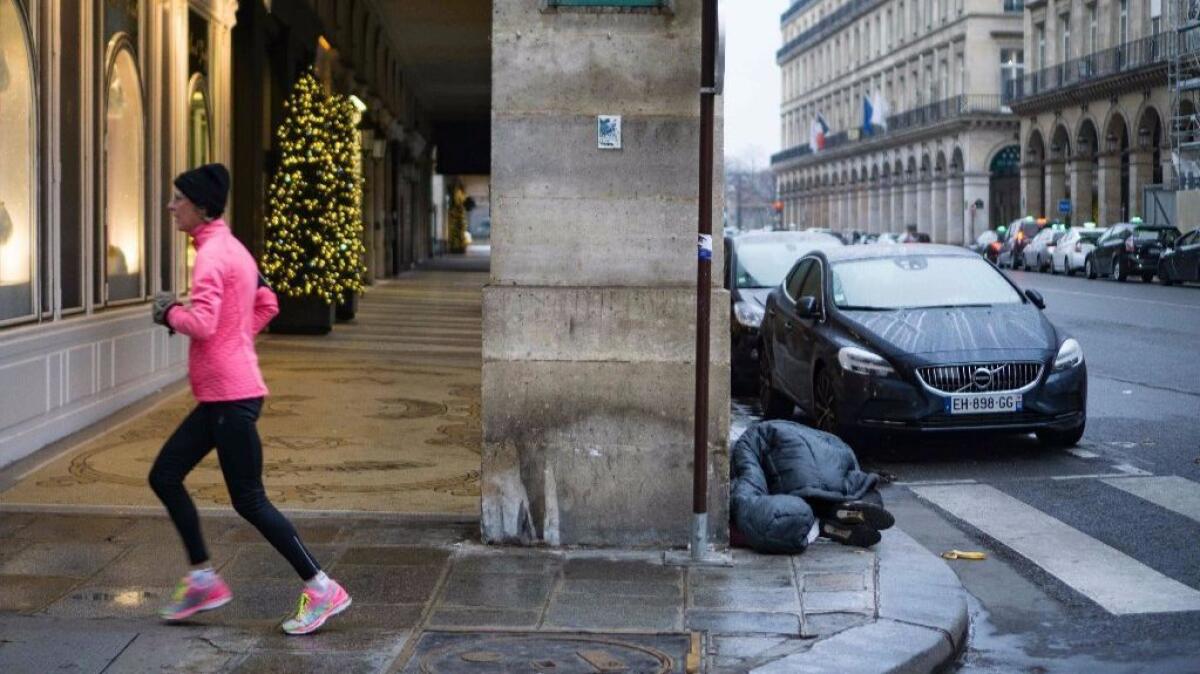Rallying support for economic fairness? Better chase off the needy

It is an odd quirk of human nature that humans do not always respond to the misfortunes of other humans in the most humane way.
A new study tosses some fresh experimental findings for that observation onto a mounting pile of research evidence. Among the affluent people in affluent neighborhoods, it finds, a clear reminder of othersā poverty does not induce a show of generosity.
Quite the contrary, in fact: After passing by an apparently impoverished person in an otherwise tony setting, the denizens of an affluent community were far less likely to express support for a measure that would tax millionaires and help distribute wealth more evenly in our society.
That finding, published Monday in the journal PNAS, offers more evidence that forging a society in which resources are more equally distributed will not only face opposition from those opposed on political principle: It seems to fly in the face of human nature itself.
Support for the āmillionaire taxā here should not so much be seen as a measure of support for a specific, and controversial, tax proposal, said Stanford University sociologist Cristobal Young.
āPolitical support for or against millionaire taxes has almost nothing to do with the 1% or .5% that would pay them,ā Young said. āIt comes down to peopleās notion of justice, of who should be paying the bills.ā
See the most-read stories in Science this hour Ā»
In studies like this one, which Young praised as āwell done and very thought-provoking,ā gauging peopleās support for a millionaireās tax should be seen as a rough stand-in for everyday giving behavior.
Its findings, Young added, underscore that while we are often capable of great generosity, we can be judgmental and tight-fisted when faced with people who look like us but are less fortunate. When white men, especially, see another white man struggling, āmy reading is thereās a sort of blame that gets attached,ā said Young.
To be sure, among the 2,519 people enjoying a fall promenade in one of three posh neighborhoods in and around Boston, not many stopped to engage with a sidewalk activist and sign his or her petition. But when Harvard University researcher Melissa L. Sands changed a few atmospheric conditions, she discerned some stark trends.
Before prospective research subjects reached the young, white, well-dressed student with the clipboard, Sands arranged for them to pass by one of four kinds of men ā all confederates of the researcher.
Two of those idle bystanders, one black and one white, were nattily dressed and politely standing, as if waiting to meet a friend. And two ā again, one black and one white ā were dressed in shabby, tattered clothes. While they did not panhandle or appear intoxicated or floridly mentally ill, these second posers undeniably looked and acted in ways that distinguished them as poor and out of place in the genteel neighborhoods of Brookline or Bostonās Back Bay and Beacon Hill.
Some 20 feet or so beyond, pedestrians encountered a polite student with a clipboard and pen, seeking support either for a petition to reduce the use of wasteful plastic bags or one calling on the state of Massachusetts to levy an additional tax of 4 percentage points on annual income above $1 million per year.
When the petition dealt with plastic bags, the responses of pedestrians was the same, whether they had just walked past a nicely dressed man or a shabby, impoverished one. But when the petition dealt with the so-called āmillionaireās tax,ā it mattered a lot: The response rate on the millionaireās tax petition declined from 14% when the bystander was white and appeared to be affluent; when the white confederate appeared to be poor, the response rate dropped 57%, to just 6%.
Race, too, played into pedestriansā willingness to stop and sign the petition on a millionaireās tax: Compared with those passing an affluent-seeming white man, those who passed a nattily dressed black man were less likely to stop and sign a petition; passing by an impoverished-looking black man made the studyās subjects slightly more likely to stop and sign.
Beyond offering evidence of some racial avoidance, suggested Young, white men appeared to be judging poor white men more harshly than they do poor black men.
āThereās a higher expectation that this person should be working, that he doesnāt face the obstacles a black man does,ā Young said.
When they see a poor black man, Young suggested, affluent white men find their situation āmore understandable, less blameworthy.ā
Follow me on Twitter @LATMelissaHealy and ālikeā Los Angeles Times Science & Health on Facebook.
MORE IN SCIENCE
Research on gun violence is severely underfunded compared with other causes of death
Less shrinkage: This is your aging brain on the Mediterranean diet
Death rate from cancer now 25% lower than it was 25 years ago, report says




